Undeterred by Gaza war, thousands of Indians turn up for jobs in Israel
Israel suspended work permits for thousands of Palestinians after October 7. Indians are queuing up to replace them, amid persistent joblessness at home.

Rohtak, India – It’s a frigid January morning and the sun has not risen yet.
A shivering Pramod Sharma queues up outside the main entrance of Maharshi Dayanand University (MDU) campus in Rohtak, a small town in the northern Indian state of Haryana, about 84km (52 miles) from New Delhi.
Keep reading
list of 4 itemsPro-Israel rallies allowed in India but Palestine solidarity sees crackdown
‘Informed solidarity’: Why India’s Kerala saw mass rallies for Palestinians
Analysis: Why is so much anti-Palestinian disinformation coming from India?
Sharma, 43, is joined by hundreds of other men appearing for a skill test for the role of a shuttering carpenter in Israel – the first time the Israeli construction sector has opened up to Indians, who had previously found work there primarily as caregivers.
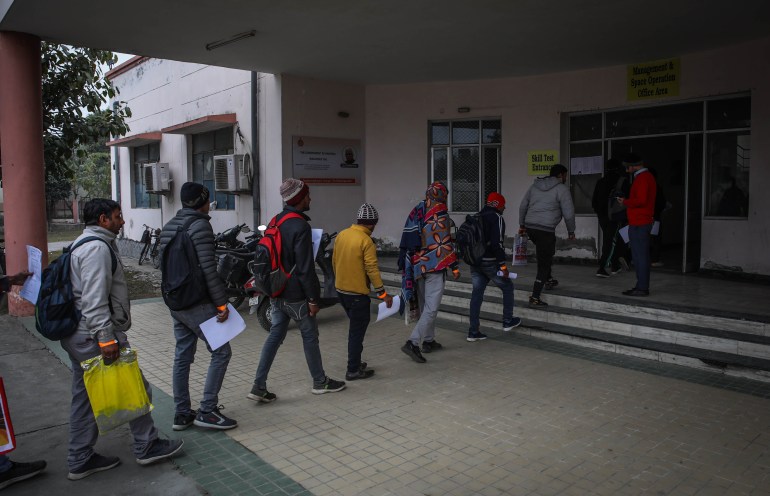
After more than 100 days of Israel’s war on Gaza, a labour crisis has emerged in the country, rooted in its decision to block tens of thousands of Palestinians from working in Israel.
In October, Israeli construction companies reportedly requested their government in Tel Aviv to allow them to hire up to 100,000 Indian workers to replace Palestinians whose work licenses were suspended after the Gaza offensive began.
Over in India, Israel’s desperate search for labour has in turn exposed a gulf between claims of economic success by Prime Minister Narendra Modi’s government, which insists that a rising GDP is turning the nation into a global powerhouse, and the lived reality of millions of people. As India heads for national elections, the unemployment rate hovers around a high 8 percent.
The Haryana government in December advertised 10,000 positions for construction workers in Israel, including 3,000 posts for carpenters and ironworkers, 2,000 for floor tile fitters, and 2,000 for plasterers. Its advertisement said the salary for the jobs would be around 6,100 shekels, or approximately $1,625, a month – in a state where the per capita income is around $300 a month.
The same month, Uttar Pradesh, India’s most populous state, also released a similar advertisement for another 10,000 workers. Reports said the recruitment drive began in state capital, Lucknow, on Tuesday, drawing hundreds of applicants.
This is the queue for recruitment drive to send labourers to work in Israel. The registration cum screening began at ITI Lucknow on January 23 is witnessing huge influx of job seekers from UP, Bihar and West Bengal. pic.twitter.com/jLsVogk7QC
— Piyush Rai (@Benarasiyaa) January 24, 2024
Earlier this month, recruiters from Israel arrived in India to interview the workers.
An official from Haryana Kaushal Rozgar Nigam Limited, one of the state government agencies overseeing the recruitment drive, told Al Jazeera an average of 500-600 applicants were interviewed every day during the weeklong recruitment drive in Rohtak that ended on Sunday.
‘Once-in-a-lifetime opportunity’
Sharma came to Rohtak with a group of about 40 other workers from Bihar, one of India’s poorest states, more than 1,000km (620 miles) east of Rohtak.
He told Al Jazeera he initially took a verbal test by a recruitment agency in Bihar, which interviewed him about construction-related topics.
“They told me I had cleared the first round, that an Israeli client will now come to Rohtak for a second round of interviews, and that I should come here,” he said.
“We have been sleeping inside the bus in this cold for the last three days and using the washroom at a roadside eatery, waiting for our interview.”
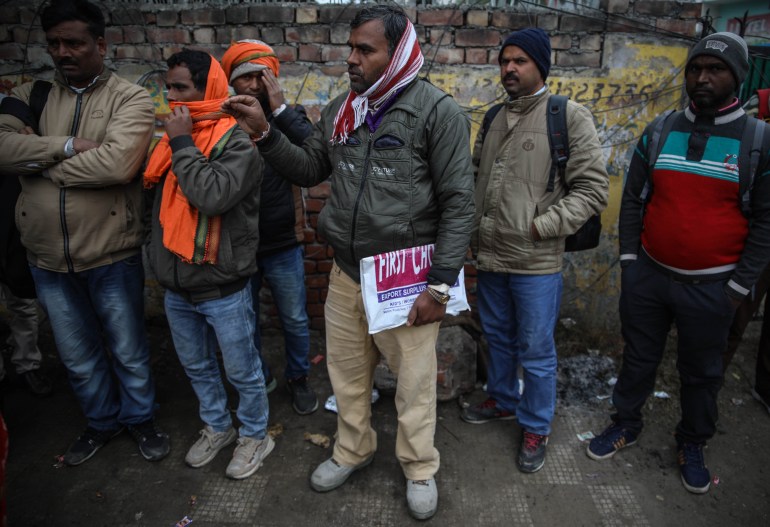
Sharma, who lost his construction job in New Delhi during the COVID-19 pandemic in 2020, said working in Israel appears to be “a once-in-a-lifetime opportunity” to climb out of poverty.
Since then, he has been working under a government employment scheme that pays him less than $3 a day for working for five hours in a field. But he still struggled to provide three square meals to his wife, two children and a dependent sister.
“If I am able to get this job in Israel, I will be able to provide for my children and save up enough to get my sister married,” he said.
Shiv Prakash, another construction worker from Bihar who returned from Saudi Arabia last year, said the salary offered by Israeli companies is three times what he previously made.
“Who would want to miss such an opportunity?” asked the 39-year-old.
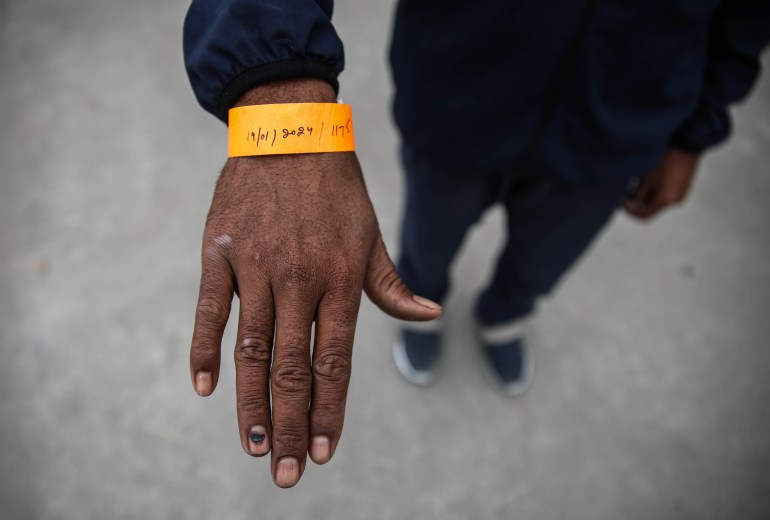
Vikas Kumar, 32, from Haryana’s Panipat district also appeared for the skill test. He said Israeli officials set up multiple construction-related simulations, with applicants performing a live demo in the final round.
Kumar works 12 hours a day as a plasterer and earns $120 (10,000 rupees) a month. He hopes to secure a job in Israel to support his family of six.
Israeli citizens, foreign workers flee war
Israel’s economy took a major hit on October 7 when Hamas launched an unprecedented attack inside its territory, killing nearly 1,200 people. Since then, Israeli forces have killed at least 24,620 Palestinians, including 16,000 women and children, in Gaza.
The war also forced nearly 500,000 Israelis and more than 17,000 foreign workers to leave the country, according to data from the Israeli Population and Immigration Authority. Furthermore, around 764,000 Israelis, or nearly one-fifth of Israel’s workforce, are currently unemployed due to evacuations, school closures, or army reserve duty call-ups for the war.
The Israeli construction sector mainly relies on foreign labour, a majority of whom are Palestinian. However, after the Gaza assault began, work licenses of more than 100,000 Palestinian workers were suspended by the Israeli government.
While the ongoing war is being cited as the reason for Israel seeking workers from India, the Israeli government had been working on the plan for well over eight months. In May 2023, Israeli Foreign Minister Eli Cohen signed an agreement with his Indian counterpart, S Jaishankar, allowing 42,000 Indian construction workers to migrate for work.
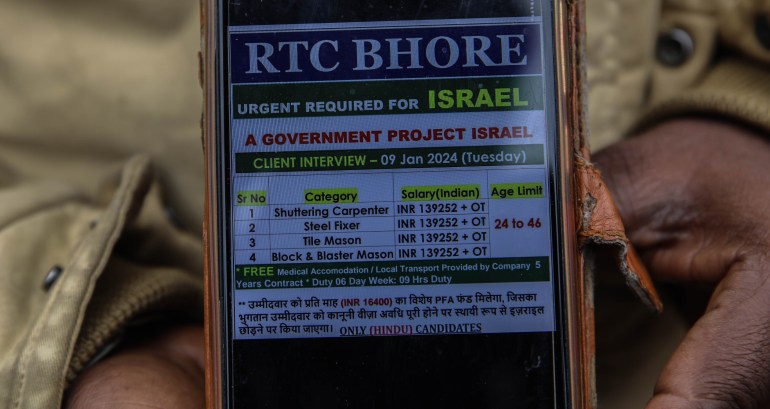
But it is not just the labour class that desires to travel to Israel for work. Young, educated Indians are also applying for these jobs in their search for a stable income.
Sachin, a 25-year-old final-year engineering student at a state-run university in Haryana, also appeared for the interview. “Nobody would want to go to a place where rockets fly overhead but there are little opportunities in India,” he told Al Jazeera.
According to a 2023 report by a leading private university, India’s unemployment rate among college graduates under 25 years of age reached a staggering 42 percent after the pandemic.
‘Oppose uprooting Palestinian workers’
But India’s plan to send workers to a country effectively involved in a genocide of Palestinians has been criticised by labour groups and the opposition.
In November, 10 of India’s biggest trade unions issued a strongly-worded statement, urging the government to not send Indian workers to Israel amid the ongoing war on Gaza.
“Nothing could be more immoral and disastrous for India than the said ‘export’ of workers to Israel. That India is even considering ‘exporting’ workers shows the manner in which it has dehumanised and commodified Indian workers,” said the statement.
The Construction Workers Federation of India, another major union, also opposed “any attempt to send the poor construction workers of our country to Israel to overcome its shortage of workers and in any way support its genocidal attacks on Palestine”.
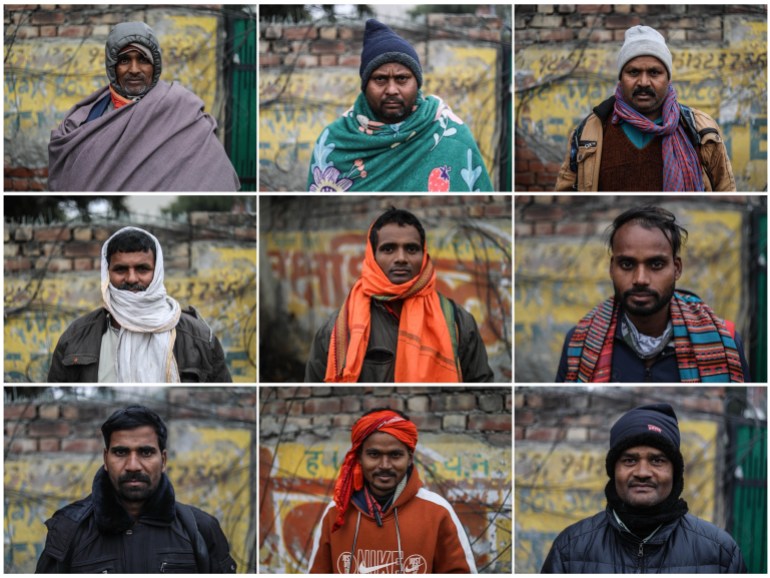
Tapan Kumar Sen, former Indian parliamentarian and general secretary of the Centre of Indian Trade Unions, said his organisation was not opposed to cross-border labour mobility, but it should not come at the expense of Palestinian workers.
“We want all workers to find work. We don’t want someone fired and someone else given a job. Every Indian worker should oppose uprooting Palestinian workers and replacing them with Indian workers,” said Sen.
Clifton D’Rozario, national secretary of the All India Central Council of Trade Unions, told Al Jazeera the Indian government was acting like a “contractor” for Israel and that the idea of sending workers to Israel reminded him of indentured servitude during the British colonialism in the 19th century.
“The state negotiating for a section of workers to be sent to a particular state, one that has a history of oppressing another community, to come in as a replacement under any circumstances is unacceptable. Even if there is no conflict, I say that is not acceptable,” he said.
As criticism mounted, spokesman for India’s Ministry of External Affairs Randhir Jaiswal last week told a news conference the government was conscious of its responsibility to provide safety and security to Indian nationals abroad. He said the labour laws in Israel were “robust and strict, and provide protection of labour rights and migrant rights”.
Al Jazeera reached out to the Israeli officials conducting the interviews, but they refused to speak or provide information about the recruitment drive.
Experts meanwhile say India should thoroughly assess the conditions in Israel they would be subjecting the workers to, even if it was financially beneficial.
In the past, Israel has been accused of violating the rights of workers. According to a 2015 Human Rights Watch report, Thailand workers in Israel’s agriculture sector were paid salaries below the minimum wage. They were also subjected to unsafe working conditions and forced to work long hours.
There have also been examples of Indian workers caught in the crosshairs of the conflicts in the Middle East.
In March 2018, the Indian government admitted that 39 Indian workers were killed after they were kidnapped by the ISIL (ISIS) armed group in Iraq. A group of 46 Indian nurses were freed in July 2014 by ISIL after more than a week in captivity.
India’s pro-Israel stance under Modi
India’s foreign policy has historically backed the Palestinian cause. But that policy has seen a shift in the past decade.
In 2017, Narendra Modi became the first Indian prime minister to visit Israel. He is also seen referring to his Israeli counterpart Benjamin Netanyahu as a “close friend” on social media.
Soon after the Gaza war began, India in late October abstained from voting on a United Nations General Assembly resolution calling for a ceasefire. Two months later, however, New Delhi backed another UN resolution demanding ceasefire.
Back home, authorities in several Indian states banned pro-Palestinian rallies and arrested people for protesting or even posting Palestine solidarity messages on social media.
Mani Shankar Aiyar, former federal minister and diplomat, said India’s policy for at least the last 50 years had been to encourage Indians to go as migrant workers in the Middle East and other parts of the world.
“Their remittances to India are a very important part of our economy. So, for economic reasons, I would certainly support the idea of Indian labourers going to Israel. However, given the context of Israel’s present genocide in the Gaza Strip, this is the worst way for Indians to make a little money out of Israel,” he told Al Jazeera.
According to a UN report on international migration, inward remittances from Middle Eastern countries to India were $38bn in 2017.
Many Indian aspirants for the jobs in Israel said they were unfettered by the war in Gaza, with some workers even supporting Israel in its operation against the Palestinians.
“Given a chance, I am even willing to work for the Israeli forces,” Yash Sharma, an aspirant from Haryana’s Jind region, told Al Jazeera.
Many others like Sharma had a far more compelling reason. “I will take my chance. It is better to die there than go hungry,” he said.